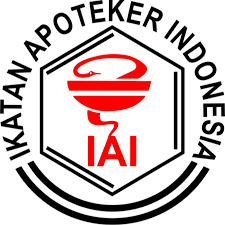Optimum Conditions for Extraction of Antibacterial Compounds from Citrus Aurantifolia Fruit Peel Waste
Rima Munawaroh(1*)(1) Universitas Muhammadiyah Surakarta
(*) Corresponding Author
Abstract
Citrus fruit peel is a major waste in citrus fruit processing industry. The research on extraction active
compounds of Citrus aurantifolia (lime) fruit peel waste and antibacterial activity assay has been done. The
aim of research was to get optimum condition to extract their active compounds which have antibacterial
activity. The dried lime fruit peel was extracted by maceration method using ethanol 48%, 72%, and 96%.
The dried and fresh lime fruit peel were also extracted using ethyl acetate. Antibacterial assay was done by
diffusion agar against Staphylococcus aureus ATCC 25923 and Escherichia coli ATCC 25922. The result
showed that optimal condition to extract antibacterial compound using fresh sample with ethyl acetate as
solvent. The ethyl acetate extract of fresh sample was more active against S. aureus than E. coli.
Full Text:
PDFReferences
Agocs, A., Nagy, V., Szabo, Z., Mark, L., Ohmacht, R., & Deli, J., 2007, Comparative Study
on the Carotenoid Composition of the Peel and the Pulp of Different Citrus Species,
Innovative Food Science and Emerging Technologies, 8, 390-394.
Aibinu, I., Adenipekun, T., Adelowotan, T., Ogunsanya, T., & Odugbemi, T., 2007, Evaluation
of the Antimicrobial Properties of Different Parts of Citrus Aurantifolia (Lime Fruit) as
Used Locally, Afr. J. Trad. CAM, 4 (2), 185-190.
Bates, R.P., Morris, J.R., & Crandall, P.G., 2001, Principles and Practices of Small- and Medium-
Scale Fruit Juice Processing, FAO Agricultural Services Bulletin, 146, 115, 132-133.
Bocco, A., Cuvelier, M.E., Richrad, H., & Berset, C., 1998, Antioxidant Activity and Phenolic
Composition of Citrus Peel and Seed Extracts, J. Agric. Food Chem., 46, 2123-2129.
Chamblee, T.S., Karelitz, T., Radford, T., & Clark, B.C., 1997, Identification of Sesquiterpenes
in Citrus Essential Oils by Cryofocussing GC/FT-IR, Journal of Essential Oil Research,
, 127-132.
Chanthaphon, S., Chanthachum, S., & Hongpattarakere, T., 2008, Antimicrobial Activities
of Essential Oils and Crude Extracts from Tropical Citrus spp. Against Food-Related
Microorganisms, Songklanakarin J. Sci. Technol., 30 (1), 125-131.
Dugo, P., Piperno, A., Romeo, R., Cambria, M., Russo, M., Carnovale, C., & Mondello, L.,
, Determination of Oxygen Heterocyclic Components in Citrus Products by HPLC
with UV Detection, J. Agric. Food Chem., 57 (15), 6543-6551.
Li, B.B., Smith, B., & Hossain, M.M., 2006, Extraction of Phenolics from Citrus Peels (I.
Solvent Extraction Method), Separation and Purification Technology, 48, 182-188.
Mandalari, G., Bennett, R.N., Bisignano, G., Trombetta, D., Saija, A., Faulds, C.B., & Gasson,
M.J., 2007, Antimicrobial Activity of Flavonoids Extracted from Bergamot (Citrus
bergamia Risso) Peel, a Byproduct of the Essential Oil Industry, Journal of Applied
Microbiology, 103, 2056-2064.
May, C.D., 1990, Industrial Pectins : Sources, Production, and Applications, Carbohydr. Polym.,
, 79-99.
Mokbel, M.S., Watanabe, Y., Hashinaga, F., & Suganuma, T., 2006, Purification of the
Antioxidant and Antimicrobial Substance of Ethyl Acetate Extracts from Buntan (Citrus grandis Osbeck) Fruit Peel, Pak. J. Biol. Sci., 9 (1), 145-150.
Morton, J., 1987, Mexican Lime in Fruits of Warm Climates, Morton J.F., Miami.
Mujahid, R., 2011, Pemilihan Metode Analisis Flavonoid secara Spektroskopi UV-Vis serta
Penerapannya pada Seledri (Apium graviolens L.), Murbei (Morus alba L.), Patikan Kebo
(Euphorbia hirta L.) dan Jeruk Nipis (Citrus Aurantifolia), Tesis, 70, Pascasarjana Ilmu
Farmasi, Fakultas Farmasi Universitas Gadjah Mada, Yogyakarta.
Nogata, Y., Sakamoto, K., Shiratsuchi, H., Ishii, T., Yano, M., & Ohta, H., 2006, Flavonoid
Composition of Fruit Tissues of Citrus Species, Biosci. Biotechnol. Biochem., 70 (1),
-192.
Tajkarimi, M.M., Ibrahim, S.A., & Cliver, D.O., 2010, Review : Antimicrobial Herb and Spice
Compounds in Food, Food Control, 21, 1199-1218.
Wanger, A., 2007, Disk Diffusion Test and Gradient Methodologies, dalam Schwalbe, R., Steele-
Moore, L., & Goodwin, A.C. (Eds.), Antimicrobial Susceptibility Testing Protocols, 53-
, CRC Press, London.
Article Metrics
Abstract view(s): 898 time(s)PDF: 1391 time(s)
Refbacks
- There are currently no refbacks.








